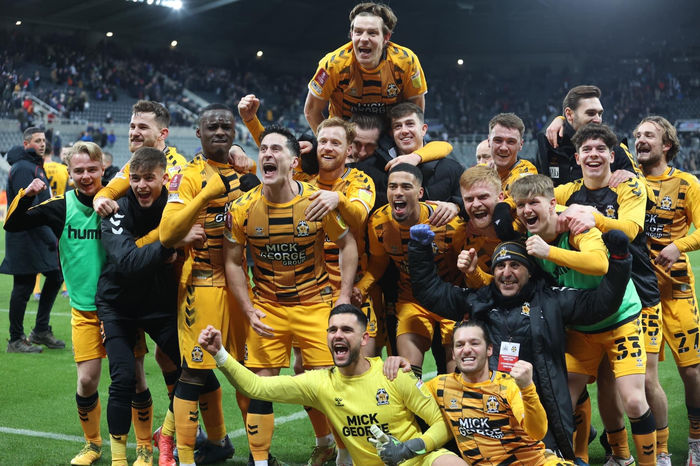Cambridge and the FA Cup: an age-old romance
With Cambridge United taking on Luton Town in the FA Cup Fourth Round this Saturday (05/02), Joshua Korber Hoffman reflects on the historic ties between the city and the oldest national football competition in the world
On Saturday (05/02), Cambridge United will face Luton Town at home in the Fourth Round of the FA Cup, following an emphatic win over Newcastle United last month (08/01) Although no Cambridge team has ever won the competition, the city’s participation goes back almost as far as the tournament itself.
The inaugural Football Association Challenge Cup was played in 1871-72, and Cambridge University participated for the first time in only the third-ever FA Challenge Cup in two years later. Their first game was played on 25th October 1873 against South Norwood, a now long-extinct London side. According to the match report in the Morning Post, the game was played at the Oval, Kennington, ‘in the presence of an enthusiastic, if not a numerous company, including many “old Blues.”’ The Cambridge team featured five players from Trinity College and a handful of other players from a variety of colleges. Cambridge scored, courtesy of an AW Hurrell goal ‘amidst loud cheers’, and managed to hold out for a 1-0 victory.
“With the cheers of the crowd on that October day in 1873 still ringing in their ears, Cambridge United will continue a long tradition of memorable FA Cup days on Saturday”
But much has changed since then. Football is no longer basically rugby without hands, and universities are no longer eligible for entry into the FA Cup. Perhaps this is for the best; watching Oxford University win the competition now, as they did in 1874, would be a tough day for any Cambridge student. Some things, however, have changed little. Cambridge-based teams – Cambridge United and Cambridge City FC – compete in the FA Cup every year. For 150 years, the city of Cambridge has been represented in the country’s most inclusive football competition, and enthusiasm has never died down.
To understand what the FA Cup means to Cambridge, one needs to understand what the FA Cup means to smaller clubs. As we saw in the last round of the tournament this year, it has the potential to provide incredible David vs. Goliath moments. It was a privilege merely to attend St James’ Park, Newcastle’s 50,000 capacity stadium, let alone leave with a victory. The FA Cup provides hope and opportunity – two of football’s most cherished products. For a small town or city in England, the tournament is the highlight of the football calendar.
The moment we stunned St James' Park. #CamUTD pic.twitter.com/ReWnW0hsvX
- Cambridge United FC (@CambridgeUtdFC) January 9, 2022
Even for the biggest clubs, the FA Cup has, historically, been the most coveted trophy – even more so than the World Cup. Colin Benson writes in the matchday programme for Cambridge United vs. Oldham Athletic in the Third Round of the FA Challenge Cup on 6th January 1974: “The World Cup, the European Cup Winners’ Cup, the UEFA Cup, the League Cup, and the Texaco Cup are all part and parcel of a season’s fixtures, but the trophy that still holds the English soccer world in awe, is the daddy of them all, the FA Cup.” What makes this proclamation of FA Cup superiority even more emphatic is the fact that Benson was writing just eight years after England’s World Cup victory in 1966. Even after the nation took home the World Cup, the FA Cup was still the most desired trophy in the land.
This is, undoubtedly, partly rooted in misplaced patriotism. The idea that the tournament to decide which is the best team in England is more important than the tournament to decide which is the best team in the world is indicative of a national superiority complex that stunted the growth of English football for decades. However, perhaps it is understandable that we should value the substantially older competition more highly. Having been responsible for the spreading of football around England and then around the globe, the FA Cup is, quite literally, the daddy of the World Cup.
Who am I to complain about the enormous value placed on the FA Cup, anyway? Cambridge United are into the Fourth Round, a feat they did not manage in 1974 and, if the huge traffic on the club ticketing website is anything to go by, the city will be buzzing. With the cheers of the crowd on that October day in 1873 still ringing in their ears, Cambridge United will continue a long tradition of memorable FA Cup days on Saturday. “Who knows, a Third Division side could reach the final this year,” signs off Colin Benson before the 1974 FA Cup tie, “while we’re in there is always hope.”
 Features / Are you more yourself at Cambridge or away from it? 27 January 2026
Features / Are you more yourself at Cambridge or away from it? 27 January 2026 Interviews / Lord Leggatt on becoming a Supreme Court Justice21 January 2026
Interviews / Lord Leggatt on becoming a Supreme Court Justice21 January 2026 News / Reform candidate retracts claim of being Cambridge alum 26 January 2026
News / Reform candidate retracts claim of being Cambridge alum 26 January 2026 News / Vigil held for tenth anniversary of PhD student’s death28 January 2026
News / Vigil held for tenth anniversary of PhD student’s death28 January 2026 News / Stand Up To Racism protests in solidarity with Minneapolis marches28 January 2026
News / Stand Up To Racism protests in solidarity with Minneapolis marches28 January 2026











